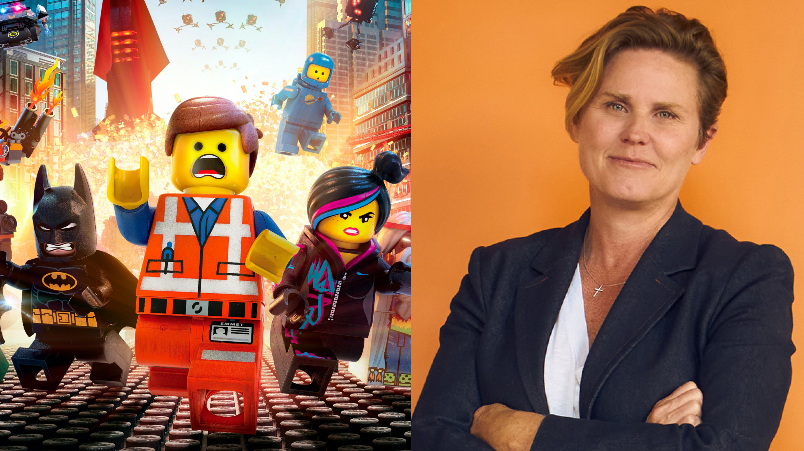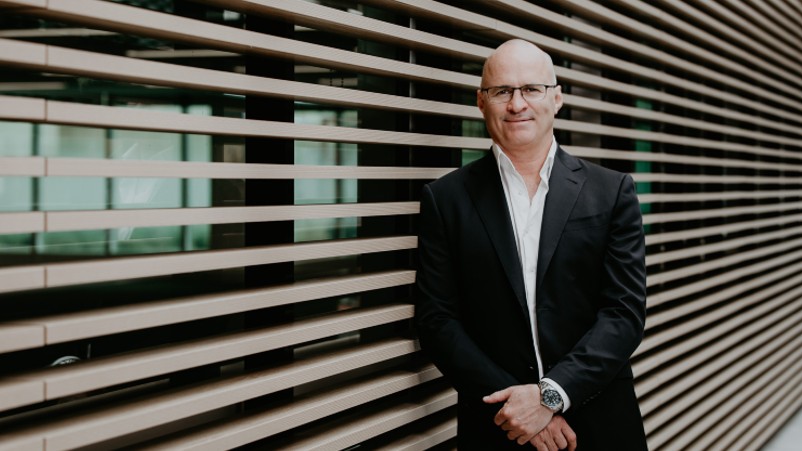Everything is awesome: Aussie expat Nicole Taylor on leading Lego’s 400-strong in-house agency, global agency partner review, content factory booming, indies delivering best ideas

“I love some of the independent (agencies)," Nicole Taylor, above, says. "I love the fact that they're not thinking of a P&L outcome. They're kind of going, 'this is just cool', right? This just makes sense to us.”
Aussie expat Nicole Taylor jumped ship from managing international creative firms to lead Lego’s in-house agency, with 400 people around the world driving a content factory, plus powerful creative, digital and production capabilities. Now, she’s leading a review of the company’s agency roster – and thinks indies are coming up with the smarts. “I love the fact that they're not thinking of a P&L outcome,” she says, instead bringing genuinely new ideas to the table. Meanwhile Lego is flying, posting record profits and sales in 2021 and outstripping major rivals Mattel and Hasbro. Taylor, who started in Sydney agencies in the late 90s, says in-housing can work wonders – speed is key, and businesses are starting to recognise the benefit of having creativity close by. Creatives are now in high demand among corporates, who see financial incentives to different thinking.
What you need to know:
- Six months ago, Lego hired Australian Nicole Taylor to lead its inhouse agency, Lego Agency. It has a headcount of 400, plus agency partners.
- Taylor is now leading a strategic review of Lego’s use of agency partners.
- She’s bullish on the strength of indies, which approach problems aiming for the best thinking without profit and loss calculations.
- Creativity is no longer just the domain of agencies. “They lost the ownership of that agenda”.
- Creative automation is “definitely on the agenda”, but speed, close relationships with “rockstar” product teams and fast turnaround of content is the focus at the moment.
- Lego is also getting more vocal on purpose issues. Taylor's boss and Global CMO Julia Goldin, in Cannes two weeks ago, called on brand owners around the world to step up and force regulation on early Web3 developments - not just see it as another benign marketing tool and audience or customer pool. Brands and tech companies, she said, had failed to keep Web 1 and Web 2 safe for humans - and kids. A safer metaverse would be a true test of brands responsibility to society and civics.
Agencies lost their ownership of that agenda, I think. And not by being terrible at anything, but just because other businesses, companies, brands, recognise the power of creativity.
The building blocks of Nicole Taylor’s career were almost universally creative agencies – that was, until she was approached to run Lego's in-house agency. Six months ago, she left her role as chief executive of DDB in Spain and became “a bit of a turncoat” by joining one of the world’s most beloved brands. The Lego Agency is the creative, art, copywriting, directing, digital, social and production department for a Danish toymaking behemoth. Lego has 24,000 employees around the world, and Taylor is responsible for 400 of them, as well as a network of external agencies. It’s her first time in-house – but working for LEGO isn’t like working for most clients.
“We’ve got movie makers,” she says. “The scale of the business is so different… it’s like a dream.”
Taylor is charged with a strategic review of how the company works with external agencies and what that should look like going forward. Not that things are in a bad way – the company made a record A$2.65 billion in profit from a record A$11 billion in sales revenue in 2021 and is widely considered to be a Covid success story, outpacing its rivals Mattel and Hasbro over the pandemic.
Some of that success could be attributed to a powerful in-house team that Taylor says works faster, more closely alongside internal product teams – the “rockstars” of Lego, and just as creatively as external partners.
Lego is also increasingly using its cache and clout as one of the top rated global brands to spearhead new societal standards and civics in tech.
Global CMO Julia Goldin, who Taylor reports into, told a Deloitte CMO forum in Cannes last month that marketing and brands had failed to ensure safety and civics with the current iterations of the internet and could not repeat the same mistakes and missed opportunities for Web3. She pointed to the Metaverse Initiative by the World Economic Forum, which is attempting to create governance frameworks for web3.
“I'm participating in that as well as the COOs of big platforms like Microsoft, Google, Meta as well as brands and also smaller [technology development] players. That’s a very important step forward, because it's recognition of the fact that web1 and web2 were completely unregulated. Everyone created what they wanted. We ended up with everybody designing their own rules and that's why we inherited so many issues.
“I think it is a responsibility of brands, but also the responsibility of big platforms, to come together to design something that is safe by design and has the right principles and frameworks in order to protect consumers, protect their rights, protect their privacy – protect them from all kinds of different things that are happening right now.”
It's another reason why Taylor says Lego was a no-brainer decision in her career.
Creativity not just agency domain
One of her early realisations on joining the company was that “creativity was no longer really something that agencies owned.” Leading DDB Australia, McCann Worldgroup and DDB Spain, she said there was a time where creativity was owned and driven by the agency.
“Agencies lost their ownership of that agenda, I think. And not by being terrible at anything, but just because other businesses, companies, brands, recognise the power of creativity,” she says.
“Creativity is popping up in more places. Businesses were actually recognising that it had a core strength, not just kind of something that you would outsource, but it was something that you should build within your own corporate strategy. And you didn't have to look far to see that. A lot of the cool things were happening were in startups as well as some of the bigger brands. They kind of had this creative agenda that went well beyond the ads that they made.”
And as creativity entered the C-suite, it opened the doors for creative thinkers beyond the next ad agency. Taylor is one example, but she’s seeing it among the other members of the agency and client team.
“Creative leaders and creative people having more options in your career… You're not getting tapped by the next network or the next creative agency brand. Lego starts knocking on your door going, 'we think you can come and add value to our business and vice versa'. So I find just the democratisation of that agenda, if you like, is really interesting and therefore your options as a creative leader or creative person are just much broader and can be.”
I love the fact that [indies are] not thinking of a P&L outcome. They're kind of going, 'this is just cool', right? This just makes sense to us.
Indies able to take more risks
There’ll always be a place for the agency, however, and Taylor says it will always be the risk takers who succeed. Independents catch her eye more often than larger groups, which find strength in cross-vertical collaboration.
“I love some of the independents,” she says. “They're just coming at things without protection of P&Ls or specialisation and they're turning up with product ideas and they're turning up with unexpected things. I think there will always be a role for that because I think we need that kind of thinking in corporations, whether we've got an in-house agency, or we don't… I love the fact that they're not thinking of a P&L outcome. They're kind of going, 'this is just cool', right? This just makes sense to us.”
Currently, it’s the mixing of digital and creativity that excites her.
“They've got again this culture, or this DNA, that's really an expert in kind of data and digital and now they're recognising the power of creativity and pouring that in. Imagine that that will have some real value in today's world.”
In-housing
Taylor leads a global team with hubs in London, Connecticut, Shanghai and Singapore that adapt global work for the local markets.
“We kind of do a lot of central production at the global level of concepting and production. But equally drive some of those more regional orientated activities as well,” she says.
The content factory, as it’s known, turns around work fast. Speed is the critical factor in an in-housing decision.
“I've always found those things really hard to make happen in an external agency at that speed. We always battle with what's important and what's not,” she says.
“Whereas here you can really section off parts and go, ‘no, this is a fast content factory and it needs to be done that way and that's appropriate for that output’. There are definitely benefits there if you can build those things.”
In-housing isn’t right for every business, she concedes. But content creation is a time-consuming process, and with more channels, tougher talent battles and an insatiable need for new and compelling content, speed is a key factor.
“As the world gets more complex as the channels get more and the need for content increases, as the role of data plays a more significant role in how that content is created, then it makes sense that you've got capability that's much closer to the business,” Taylor says. “You can't afford to kind of take it out and bring it back in.”
Data-led creative, automation, personalisation
The Lego Agency is in the process of transforming into a more data-led creative enterprise, and creative automation is “definitely on our radar”. Selling through a lot of third parties, Lego doesn’t own the relationship with the consumer, but its stores are building the product experience and, like many brands, there’s a growing awareness of the value of direct relationship.
“We've got a real chance to own every part of that ecosystem without disconnecting the data collection chain,” Taylor says. “So that's something we really care about here. And there's a whole program not driven by me specifically around that.”
Lego’s product team are the best of the best, she says. They’re “the real creatives”, which is probably not the best description for them, she adds. “But they’re at the centre of what Lego is from a creative point of view,” she says.
Awards
Lego is a naturally creative business, Taylor says. A family-owned operation, the owners keep close tabs on what’s happening and shy away from spotlight and accolades. For the Lego Agency, she wants to change that. The company should be entering more awards for its work, Taylor reckons, and lifting its own creative profile.
“I think we can get a bit more loud and proud on the agency itself, within the industry and feel like a legitimate kind of person or company within it,” she says. “There is a humility here, so we don't like to brag too much, so awards isn't a natural thing. But if we do it in the right way and get recognised for the right things, like the diversity and inclusion initiatives that we do and/or other things, then I think it will work.”


